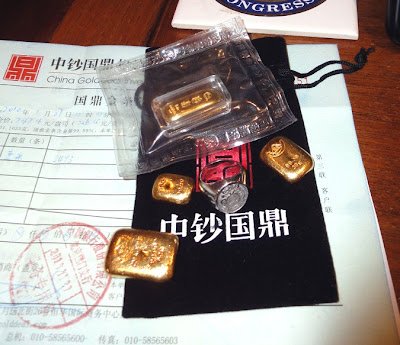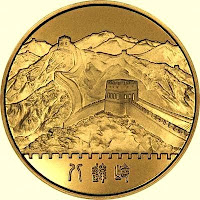Below is a brief note from a friend abroad about his trip to Beijing and his experiences there with the retail gold trade which I found to be interesting. It is a sharp contrast to my last trip there over ten years ago.
The last time I was in Beijing was in 1998, and it must seem to be a different world there now. Back then there were few cars and a sea of bicycles. As a friend and I took a pedicab back from the Forbidden City to our hotel, it did seem as though we were in an ocean of moving people, bicyclists weaving about in ever shifting traffic patterns, with order maintained by some unspoken set of rules and deferences. There was no air pollution to speak of, and the sky was a deep blue, and the breeze crisp even on a sunny day.
Beijing was a sharp contrast to the great cities of the south. Vibrant Hong Kong nestled on the coast, and Shanghai, an expanding mass of grey on gray, concrete bristling with construction cranes. The sprawling capital seemed almost pristine, delicate. Especially if you did not see the huddle of one story concrete block villages on the outskirts of the main thoroughfares. But even they were more rural and underdeveloped than squalid like similar dwellings of the lower caste workers in the West. There was no litter or disorder, anywhere.
A major access highway was being constructed for the Olympics which the city hoped to host, which they did roughly ten years later. We marveled at the complete lack of heavy machinery, the mass of hand tools, and spiderworks of tied bamboo scaffolding.
The hotel was marvelous, with the kind of extravagant niceties that only a developing country can effortlessly provide to the prospective export trade. A twenty piece orchestra of excellent musicians in the spacious hotel lobby while you drink your coffee and tea in the afternoon is something that one rarely sees in a European hotel. And in the States, it is always impersonal, mass produced, and perfunctory. Welcome to the cult of death. Have a nice day.
Lovely people really, but the hardships of the countryside marked the faces of the peasants as we traveled outside the city to the Great Wall with our guide, Big Mah, so noted by his stature, which was average by European standards. The Wall itself runs the hilltops, clinging to mountainsides with remarkable tenacity. One does not walk the wall except for brief spans, and then you climb. The inclination is astonishing and the steps really large blocks, so it is an effort to lift your legs high enough from one to the next.
We labor to the top, to obtain a souvenir 'chop' on our paperwork at the summit, a symbol of our resolve. We are oddities again, some of the few Westerners. Crowds though of Chinese tourists exploring their heritage.
I am tired and sweating, regretting the lunch I ate earlier that day before the climb, and shamed by a young Buddhist monk who bounds up the incline like a gazelle, enigmatic smile spreading across his face, large straw hat in a fluid motion with his robes. I wonder why he is there. Do monks go on vacation? All he carries is a small leather purse and a stick.
Beyond that top point is the Wall unrestored, a shambles really, a recognizable collection of stone but not much more. Hardly a wall, more like a resilient pile of manmade things with a sort of quiet endurance, waiting for its renewal and the restoration provided by a Ten Year Plan, or not.
The visit to the cloisonné factory revealed a large showroom with small shops in the back staffed by women, intent as they worked in appalling, dirty conditions on ancient looking machinery. No health and safety inspections here. This is the ideal capitalism as Bill Gates described it after his own visit to the People's Republic. Keep your head down and your mouth shut.
At the tombs of the emperors we saw great stone rooms, empty of any furnishings or artifacts, stripped of all decadence during the Cultural Revolution. At least they have not despoiled the tomb of the great Qin Shi Huangdi, which sits in brooding solitude under its man made mountain on the plain. Is it truly superstition that prevents its excavation, or a fearful respect for what is recorded to have been the labor of tens of thousands of men in burying their first great Emperor in what is said to have been astonishing opulence, rivaling and perhaps surpassing that of the Pharaohs.
At the nearly deserted Friendship Store we watched a man slowly and painstakingly painting the insides of small medicine bottles with intricate strokes from a brush that seemed to consist of a few hairs. I have several of them still, on a shelf in my study. I sometimes wonder what became of him, and his quiet obeisance to art and the dignity of craftsmanship. It is good to surround yourself with little reminders of people whom you have known, for their spirits are all that will remain when the last stars flicker out.
There were few tourists, and my Italian chief engineer and I would draw more than a few stares from the passersby as we walked down the broad avenue towards Tiananmen Square. There was a McDonalds but it was closed for lack of interest. Groups of people crowded around what looked like newspapers posted on public boards, a primitive version of the Internet cafe.
We watched a football match one evening in the hotel bar via satellite, Italy versus the Czech Republic. I pretended to sympathize with my friend in the Italian loss, which for him was disgrazia e disonore, for the Italians to lose to such a team as mine, but I secretly reveled in the win. There was nothing else to do, as they had no grappa on hand to ease his suffering. It was the only thing that would absolve such an indignity, except time.
As a guest of the government we dined one evening in an official restaurant, with doors guarded by soldiers. Dinner was a treat, but the attempts to playfully intimidate me with a still lively lobster 'sushi' were misspent, as I had done my time in Tokyo and the small places off the Ginza playing that same game with my Japanese friend Shino san. I am a citizen of the world, and nothing is alien to me except sin.
Afterwards they had group karaoke and dancing marked by a charming innocence. The old gold toothed host challenged me to a drinking contest, with something that tasted like distilled kerosene served in a heavy white ceramic teapot that in Chinese was called the alcoholic's friend. I refused to be shamed into it and deferred, as I had to get up at 5 AM the next day for a flight that could not be missed, as it only ran twice a week as a nonstop to Scandinavia. If missed, it meant a lengthy flight with a connection through Bombay. No time for hangovers.
One of the young ladies remarked about a recent film she had seen, The Bridges of Madison County. I had never seen it, and still haven't. She was impressed that American men could be so sensitive, as she had been led to believe that we were barbarians. I did not have the heart to tell her that despite some finer moments, we really are. And so are hers.
Everywhere the clerks were polite but restrained, obviously pained to please, but especially when changing money. Slogans in Chinese were everywhere, urging the populace to work hard to achieve the award of hosting the Olympic games, to the point of civic obsession.
The airport was a nightmare of people and traffic. The line to enter the departure area was a clotted mass of people surging towards a tiny female guard. After facing down her fierce glare and outstretched hand, I learned what was required from a young German tourist with backpack and halting English, directing me to first purchase a departure tax coupon at the other end of the terminal. Don't panic, just get it done.
Once past that narrows of official release, there were piles of luggage and a small stand, barely a cardboard table and marked by a tiny sign, where one checked in for the non-stop flight to Copenhagen. I was so worried about missing the flight that I took my carry-on to the gate and sat on it, forgetting to exchange my Chinese money on departure, in violation of their currency controls. The money was a key plank in their ten year plan, like the exhortations on the walls.
It's all different now. China seems to be making the great leap forward. I have heard that the sea of bicycles is gone, replaced by impersonal masses of metal moving in linear formations. They even have smog in the city, an innocence lost.
And where is the West going? Is there some force that is causing the wealth of the people to seek a level, flowing from West to East, to bring all to the lowest common denominator? Or are the elite powers merely leveling the common people under their governance and the will to power? Are the great world civilizations converging around the individual, to crush his spirit?
And what price freedom.
Just returned last night from Beijing. While on standby at airport from 11:30 AM until 6:30 PM (all classes of all half-hourly flights of all airlines were overbooked and loaded full, and so asia mile / marco polo gold membership were ineffective in attempts to cut in the queue). Beijing-HK air travel business must be good.
To kill time, I extracted paper cash from atm network and exchanged same for little one troy ounce monetary gold wafer at airport sub-branch of bank of china. The staff were courteous, and the sub-branch manager spent 5 minutes with me to explain the way to buy and sell back gold.
Each wafer is individually numbered, and registered.
China is progressing fast in its re-engagement with gold. Wonderful. It is interesting that gold seems to be everywhere now at the China retail level, legally bought, kept, sold back, and all tax free, at transparent pricing, in alignment with gold reform that was two decades in planning, implementation, and rollout.
Now that is market capitalism, which the US banking system is now sadly lacking. A free market is not dominated by opaque complexity, endless frauds and limited choices, with high rents extracted by government license, feeding on productive effort, placing toll booths across fundamentally simple transactions with a nightmarish private bureaucracy and regressive taxation. That is feudalism, or more recently, crony capitalism.
Capitalism is about the creation and the adding of value, satisfying customer demands, thereby making them -- happy. It is not the taking of inordinate fees through legalistic snares and artificial complexity, obstacles and contrivances, government sanctioned monopolies and corporate racketeering.
The Banks and politicians no longer respond to the people, their customers, because they have merged their interests to the exclusion of all others, serving themselves, undermining the fundamental basis of social relationships and trust. The starting point of regulatory reform is no longer what the people need, but rather, what Wall Street requires. This is the same model as the US health care system. The corruption starts its financiers, but has its roots in Washington.
And so perhaps we may have a global recovery, even prosperity, and a return to the discipline of the market, if we bury our would-be emperors, the Banks, with their terra cotta army of regulators and politicians.


































